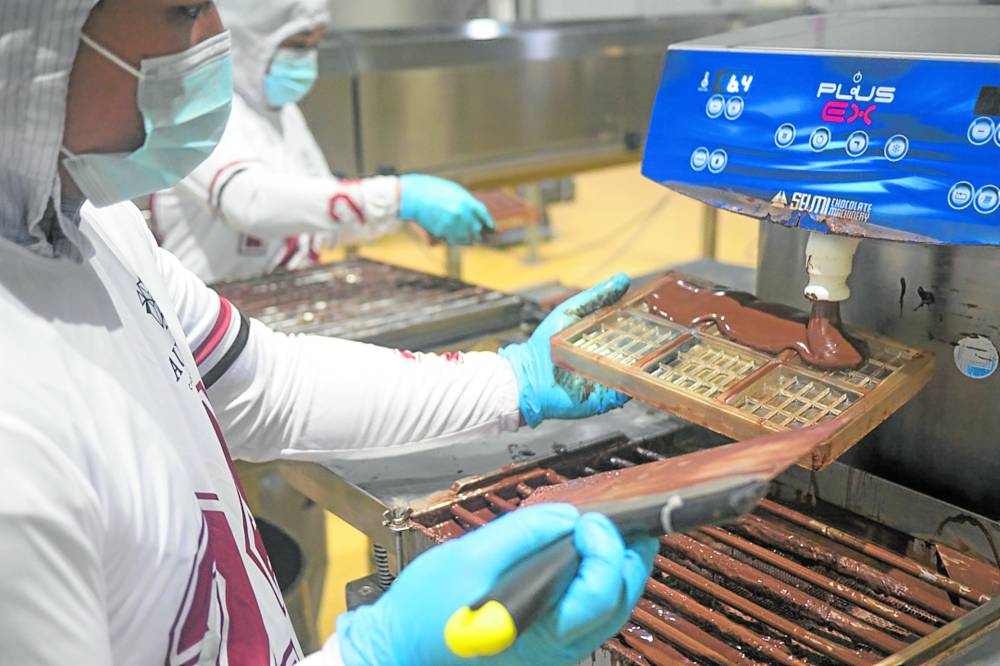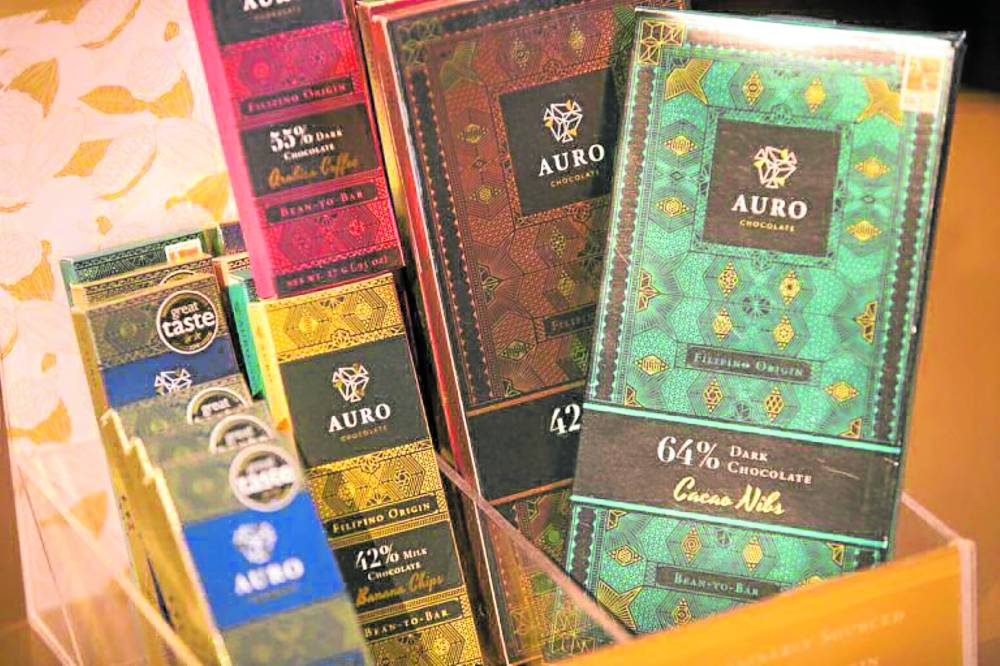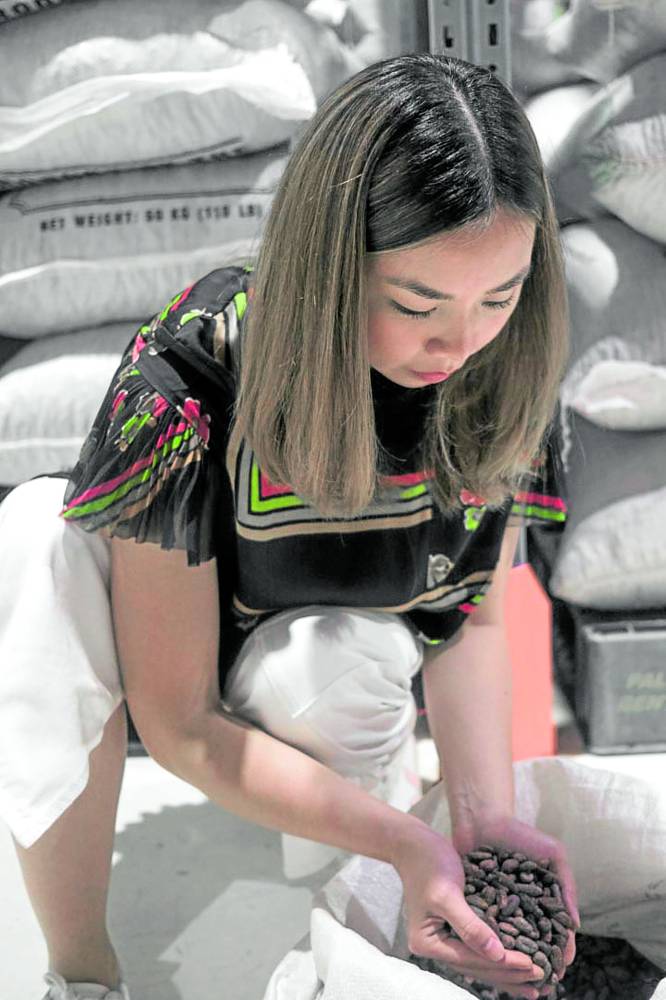Filipino chocolatier earns golden ticket to EU market

SKILLED The cofounders of Auro studied chocolate production at the ZDS Institute of Germany. —CONTRIBUTED PHOTOS
While finishing her degree in political science and international studies at the University of Chicago in 2013, Kelly Go got a taste of an American craft chocolate using cacao from the Philippines.
This experience influenced Go’s career aspirations. After graduation, she decided to learn more about this craft by enrolling at Le Cordon Bleu in Paris for a diploma in culinary arts. This training enhanced her knowledge and skills about the food business.
After that, the love for food, culture and chocolate pointed her to Germany where, with her best friend Mark Ocampo, she took an immersive course at the ZDS Institute to learn more about chocolate production.
Go and Ocampo both grew up in the Philippines and first met in Chicago, instantly bonding over their love of food and culture.
“We saw the potential of elevating the fine chocolate market in the Philippines and an opportunity to pursue our shared dream to move back home and contribute,” says Go.
Upon returning to the Philippines in 2015, they cofounded Auro Chocolate, which they registered with the Securities and Exchange Commission.
The company name was derived from the chemical symbol for gold—Au—and “oro,” which means gold in Filipino and Spanish.
On its website, Auro says its mission is to “refine Philippine cacao and elevate the lives of our local farmers who are as precious as gold.”
Auro launched in 2017 as a “tree-to-bar” chocolate brand and social enterprise that espouses community development programs and premiums above commodity price for supporting farmers.
With all beans sourced directly from farms, Auro is promoting sustainability by working directly with cacao growers to produce fine beans, improving ingredients and expanding retail products with unique and bold tropical flavors such as dried mango.

GSP+ QUALIFIER Auro Chocolates is one of only 24 Filipino companies that are able to export to the EU tariff-free
Offshore journey
From a team of 20, Auro has grown to more than 100 employees working toward the exportation of its products to the European Union (EU) and other countries since 2018.
“We involve ourselves in every step of the process by consistently working with our partner farmers to enable them to produce fine quality cacao beans that meet international quality standards,” says Go.
Still, Auro faced challenges before gaining a foothold in the EU export market.
“At selling events, people would question the quality of our products as chocolates from the Philippines are unheard of,” Go notes.
To win the trust of consumers for chocolate products grown and made in the Philippines, Go and her team needed to keep abreast of mandatory and procedural requirements to ship their products to the EU.
In navigating the regulations for exporting to the EU, Auro Chocolate had support from the Export Marketing Bureau of the Department of Trade and Industry (DTI).
Also, the Center for International Trade Expositions and Missions helped the company in organizing country booths in key international trade fairs, such as Salon du Chocolat in France.
Sales have increased by almost 200 percent since the onset of the COVID-19 pandemic. Now, Auro is directly exporting to more than 15 countries with over 40 European chocolate makers using the company’s fine cacao beans to make Philippine-origin chocolate.
Go realized that with European chocolatiers developing a taste for Auro’s products, being able to export to the EU means that Philippine cacao can compete globally with other well-known chocolate brands.

HANDS ON Auro cofounder Kelly Go checks cacao beans
Perks
Thanks to the EU’s Generalized Scheme of Preferences (GSP+) that removes import duties from products of developing countries, Auro was able to competitively price its products vis-à-vis other brands.
Through a technical assistance project dubbed Arise (Asean Regional Integration Support) Plus-Philippines, the DTI is enabling homegrown exporters to take advantage of access to the EU market as well as the trade privileges granted under GSP+.
Funded by the EU with the International Trade Center as the technical agency for the project, Arise Plus Philippines also involves the Department of Agriculture, Food and Drug Administration, Bureau of Customs, the Department of Science and Technology, as well as the private sector.
“Our chocolate bars are doing well due to the GSP+, which serves as a gateway support to the EU market,” Go says, adding that her company continues to grow business with EU partners.
With the GSP+ status, Auro products are now part of the international cacao beans market, which has led to the increase in sales.
“This means there is a growing demand for our partner farming community’s beans, thus generating more income for them, while providing a stable market for their cacao,” says Go.
Moving forward, Go and her team are ready to set higher standards of achievement for Auro.
“We have exciting plans. On the farm side, we are to launch more community initiatives that are interwoven with our current cacao program,” she says.
“We are also expanding our sourcing to introduce new, exciting origins of chocolates,” she adds. “Shifting to more environmentally friendly practices and materials across the supply chain is also on the cards.”
To other small and medium businesses that are aspiring to be exporters, Go advises them not to feel intimidated when applying to qualify for the GSP+ incentives.
“DTI is there to assist you throughout the application and help make your brand marketable,” says Go. “It’s also a great opportunity for your products to be introduced and grow in the EU market.”
